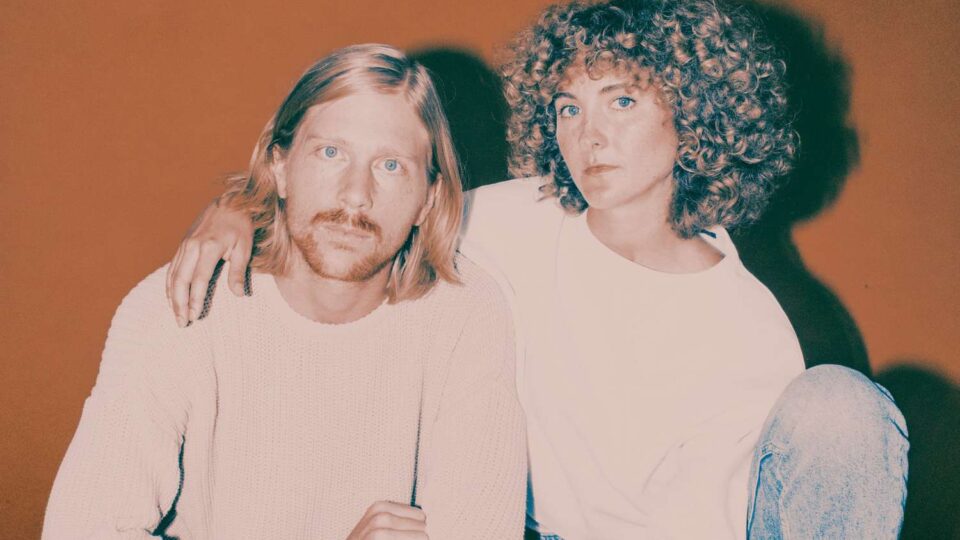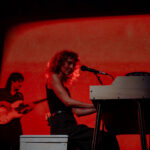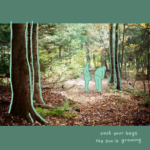On Thursday, October 19th, University of Colorado-birthed duo Tennis, composed of Alaina Moore and Patrick Riley, will be gracing the stage at The Englert Theatre as Track Zero’s fourth featured act within the series’ many-hued, well-seasoned setlist of artists.
Founded in 2010, through a destined encounter sparked within the philosophy department in 2008, Tennis released their first full-length album, entitled Cape Dory in 2011, under Fat Possum records. Meanwhile, their most recent album Pollen, released earlier this year, showcases their evolved sound the most. It’s a vibrant profusion of unlimited nostalgia for surf-pop. As Moore sings about shorelines, sunsets, and clovers, the album is ever flourishing with an organically natural elegance that is incited by its flair for genial bass lines and reverb-tempered guitar riffs.
In such tracks like “One Night with the Valet” and “Gibraltar”, one can observe a jaunty, breezy tempo that leads one to believe that Tennis is a band for buoyancy, a listen for the sake of floating or flying. Mnemonic to adult-contemporary and light-rock from the ’50s through ’70s, Tennis takes after accents and timbres that pay homage to such beachy phenomena like yacht rock. This led to the discovery that most of these songs were written, inspired by the couple’s voyages and expeditions across the sea by sailboat.
Delectably charming and dear, other albums of Tennis such as that of 2020’s Swimmer, display illuminations of a skirmish between self-love and the love of another. Scrupulously encapsulating what are meditations and introspections on the waves of love, whether Tennis chooses to glide through it by billow or by ripple. Chillwave, with inklings of lo-fi cadence, Tennis employs their dexterity for tinges of hypnagogic pop as they practice the revitalization of an old scene.
In this interview, we speak with Tennis’ Alaina Moore about what their music signifies for them, who their music is for, and how their music came to be.
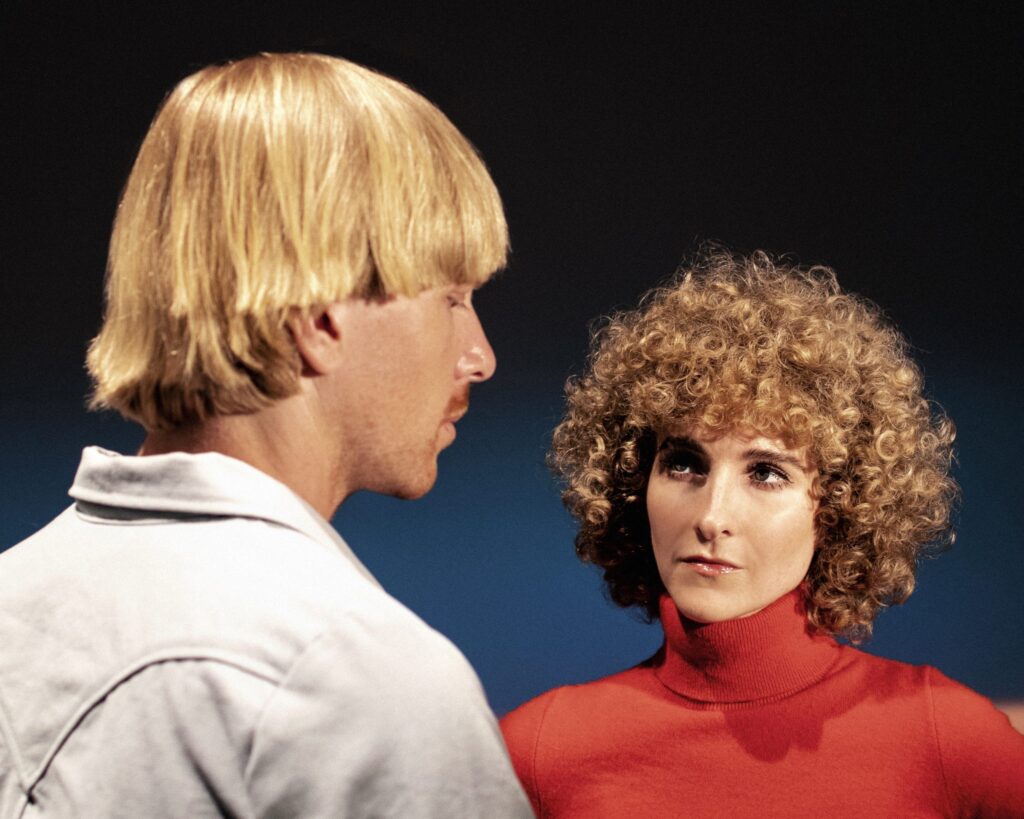
Image via Ladygunn
As you claim, Tennis was birthed upon the halls of the University of Colorado’s Philosophy department, how did you as a duo come about that sonically? Was the desire to pursue music immediately mutual, and what was the driving factor that led to a connection that encompasses your current kinship for sound?
Patrick and I bonded over music early in our relationship. Patrick made me mixes and would drop them off at my work. It was a very bold move that clearly worked. But the sonic direction for Tennis came to us when we were sitting in a bar in the Florida Keys. The bartender was playing all ’60s girl group music and the song “Baby It’s You” by The Shirelles came on. I asked Patrick about the drum tones in the song, why they sounded so different from modern drums. He surprised me by knowing a lot about recording and explained how they were recorded with a ribbon mic to tape, et cetera. I said “I wish music was still engineered in the same way,” and he said, “Let’s do it ourselves.” That was really the beginning of Tennis, which is why our first two records are so Phil Spector-y. We eventually grew out of it but I almost think it’s a rite of passage for an artist to start off by emulating that Brill Building era.
Your tonality is often associated with surf-pop and yacht rock as both lyrically and instrumentally, your music evokes the feeling of the beach atmospherically. How did your expeditions and voyages across the sea via sailboat influence how your music is conveyed and transmitted to listeners?
Neither of us thought of making music until after we went sailing. I didn’t want to write about anything other than the sailing trip because at 22 years old, it was the most interesting thing I’d ever done. That certainly explains how we fell into that genre. I’m glad we got our start that way because it was very focused. It was our only concept album in that sense. It was about a time and place, and had a specific sound. There’s not even any bass guitar on our first album. We wrote and recorded it as a three piece. We don’t work that way any more and we’ve definitely moved away from that sound. I can’t speak to how our music is transmitted to listeners. I try not to have any expectations in that area.
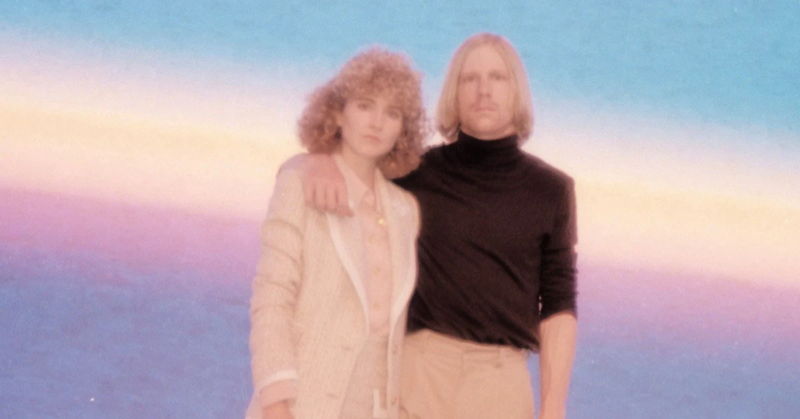
Image via Tennis
Skateboarding, I saw that this is an activity that the both of you particularly enjoy doing. Does gliding and drifting help inspire you when in the stage of conceptualizing music?
Patrick is a skater and I started to get into it during the pandemic. He’s a good teacher. He taught me how to do a shuvit which I didn’t think was possible for me to learn at 38. Patrick had stopped skating for a while but his therapist encouraged him to get back into it, which is incredible advice. It forces you to clear your head. When you’re skating you can’t think about anything else or you’ll crash. It’s extremely meditative in that sense. We like to skate when we want to stop thinking about music.
A lot of your visuals feature the outdoors. How does this kind of imagery influence the way people perceive your music?
Music videos cost a bazillion dollars that we don’t have, so we’ve had to be really scrappy to make what we have. But we still put a lot of work into what visuals we think correspond with the essence of the song. Often I will have something in mind when we’re recording. Some songs are very obviously day time, and others are night time. Some songs sound like the outdoors and others sound like a created set. We do our best to honor that intuition.
You went on tour this year for the Pollen album, do you have a specific memory of performing live that you occasionally like to look back on?
Yes. We headlined The Beacon Theatre in New York for the first time. It was just a monumental personal achievement. We were all really nervous and overwhelmed. During load in, the venue staff thought Patrick and I were roadies because we drive the vehicle that tows the gear. It made me really happy to show up to one of our biggest shows and be mistaken for a crew member.
In the “Let’s Make a Mistake Tonight” music video, Alaina, you play an oversized piano. Do you like to integrate these absurdist abstractions to your identity as a band?
That was Patrick’s idea. He literally got it from the movie Big. Whenever an idea makes us laugh we go with it.
Chillwave is another descriptor occasionally used to reference your music. Would you say your casual utilization of lo-fi implements a further lightness and nimbleness to the modulations that are pitched to your sound?
We just really like lo-fi music. We haven’t made much of it lately but we’re partial to anything blown out, filtered, or varispeeded.
When exposed to your music, one catches a sly tinge of hypnagogic pop, even psychedelic rock, through the medium of very subtle reverberations. Are these slight nuances of sound meant to be homages to these original movements of music?
Patrick and I draw from a wide variety of influences so it makes sense for these elements to seep through. For our song “Gibraltar” on Pollen, we channeled The Red Hot Chili Peppers and The Electric Prunes and I was reading Sylvia Plath’s poetry. That’s an odd pairing of influences but we felt like it worked.
You write about love songs, those to the self and to others. Why would you say two sides of the coin are important? Would you say you’re bending the rules of love songs by doing this?
I don’t want to write a song that has already been written so I try to bring in a unique perspective. I never even want to write love songs, but I find myself doing it anyway. I just can’t quit it.
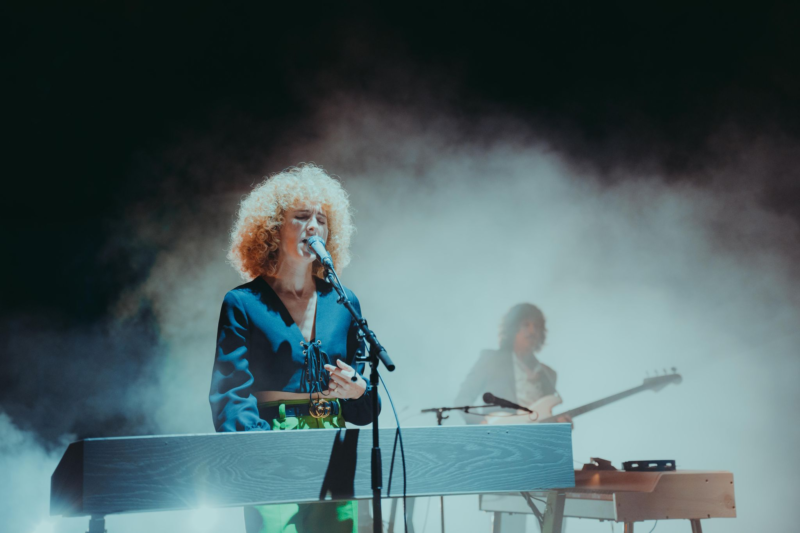
Image via 303 Magazine
Vocally, you elicit such accents and inflections that hark back to the Bee Gees and ABBA as somewhat in a more evolved form. Would you believe that this style of vocals is seemingly growing outdated?
Disco is really in right now. Also, the Bee Gees and ABBA are timeless! I never think about the cultural relevance of anything we do, we just try to please our own ears and try to avoid doing anything too trendy, which weirdly sometimes results in doing something trendy, but it’s impossible to control that. You just have to follow your own instincts.
You have previously covered a series of songs in the past, one of them being one of my favorite songs of all time, Broadcast’s “Tears in the Typing Pool“. Your rendition had made the song so much more punchy and bubbly with its animated and chirpy feel. Would you say that your qualities as a duo translate into anything and everything that you do? Including covers of other songs?
“Tears in The Typing Pool” is one of my favorite songs as well! I’m obsessed with Trish Keenan. RIP. We recorded that song in a parking garage with a handheld mic and four track tape recorder, so we really weren’t thinking about being bubbly or animated.
Listening to your discography, what I’ve concurred is that sound-wise, you simulate the feeling of buoyancy or, rather, floating and flying. What do you wish for your listeners to feel upon listening to your music?
I almost always write from my own point of view. Since I’m the one who has to sing those lyrics night after night onstage, I want the songs to connect with me, with my experiences, otherwise I can’t do it authentically. I like that you get a buoyant feeling from listening.
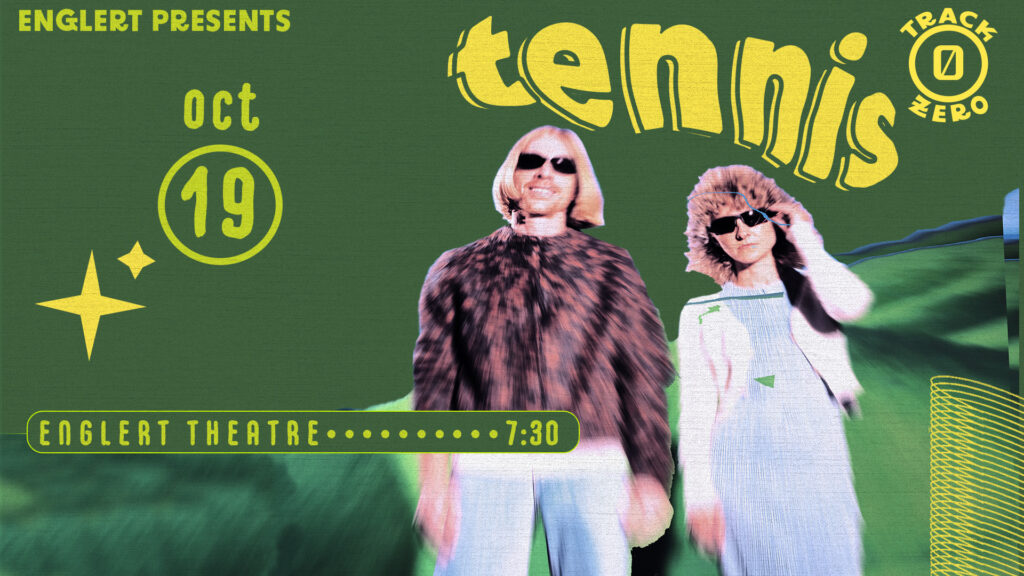
Image via The Englert Theater
Next to Tennis, Sam Evian, who withholds the same affinity for dreamy, chiptune like tonalities, will also be performing. Evian’s music, as noticeable in his 2021 album entitled Time to Melt, hums to a tune evocative and redolent of a world seen through the tincture of rose-colored glasses, which consummately fits into Tennis’ spacey, cosmic temperament for sound. Tennis and Sam Evian will be making their Track Zero debuts on Thursday, October 19th, at 7:30 PM, at Englert Theatre.

